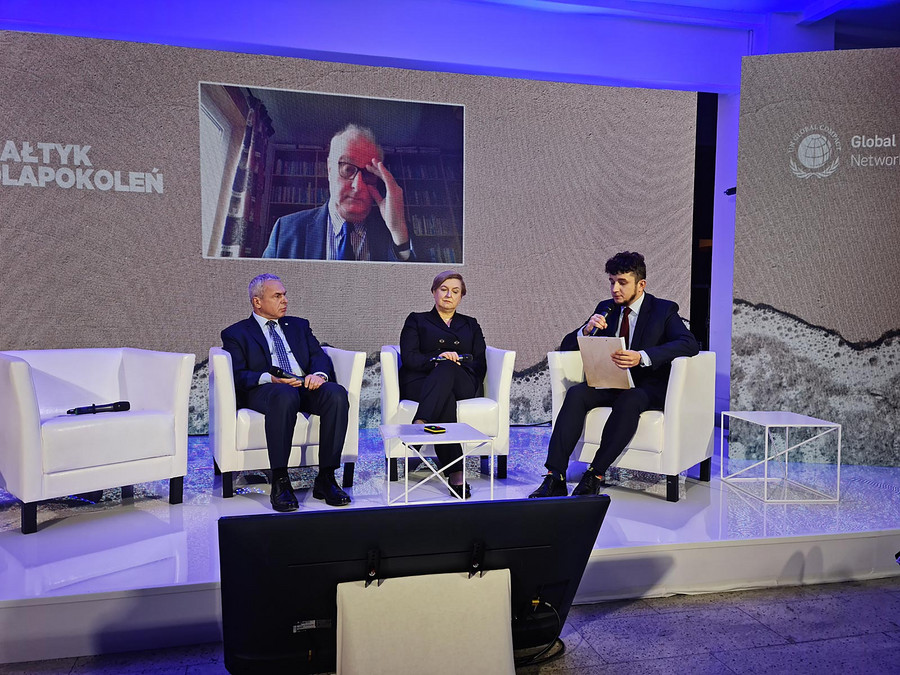Baltic Seas and other seas around Europe and other continents are threatened by old and new sources of pollution and emergencies. Among the most dangerous are thousands of tons of dumped chemical weapons, ammunition, and wreckages, which corroded and started to leak. The seabed is increasingly being disturbed by construction projects: cables, wind farms and pipelines. These growing seabed activities could lead to deliberate and accidental spills of these chemical weapons, oil and other harmful substances. Global climate change promote reemission of toxicants from sediments in some sea bottom areas. For many years national and international awareness is growing on multiple dangers linked to dumped chemical weapons, ammunition, and wreckages. ICCSS presents plan to move from endless debates and awareness campaigns to international action to their removal.
ICCSS President, Amb. Krzysztof Paturej, actively participated in the inauguration conference on 3rd December 2021 in Gdansk, of a new project: Baltic for Generations, initiated by ENEA, leading Polish electric energy provider, and UN Global Compact Network Poland. This new pan-European project draws national and international attention to the growing problem of chemical weapons and ammunition in the Baltic Sea.
This international event attended by politicians, scientists and experts, started an educational campaign on challenges posed by dumped chemical weapons, ammunition, and wreckages at the bottom of the Baltic Sea. Mr. Jacek Sasin, Deputy Prime Minister in on-line address highlighted the relevance of this issue, and stressed a need to coordinate efforts to increase maritime safety. He informed about the work of the inter-ministerial group on sea-dumped chemical weapons. Mrs. Anna Fotyga, Member of European Parliament, former minister of foreign affairs, expressed her optimism on finding solutions to the sea-dumped chemical weapons. She recalled a close cooperation of Poland with Lithuania on these issues. A broad cooperation and an active engagement of academic community will be important factors to make a significant progress, she added. Mrs. Anna Fotyga was the initiator of the 2021 Resolution the European Parliament (EP) - 2021/2567(RSP) on review of the situation regarding chemical weapons dumped in the Baltic Sea after the Second World War and plans for their removal. Prof. Jacek Beldowski, a leading Polish scientist on maritime safety, and leader of EU and NATO projects on dumped munitions, stressed a need to intensify efforts to mitigate consequences of dumped chemical weapons and munitions from growing activities in the Baltic Sea. Prof. Adam Cumming, from Edinburg University, who chairs NATO Special Group on sea-dumped chemical weapons, informed on-line about growing NATO activities and technical and technology solutions, to deal with these weapons. Mr. Łukasz Porzuczek, CEO of GeoFusion Group, Poland, briefed about concrete technologies, developed in Poland, ready to be used to handle such weapons, including their removal.
ICCSS President stressed the importance of the 2021 Resolution the European Parliament (EP) which for the first time forged plans for removal of dumped chemical weapons in the Baltic Sea. EP Resolution brought the issue of dumped Chemical Weapons from the shadow, from discussions among the experts, to the to the European agenda and the European decision making process.
ICCSS President outlined a plan: From talk to walk on sea-dumped chemical weapons and munitions. Its objective is to move from endless debates and awareness campaigns on sea-dumped munitions and chemical weapons to international action on their removal. The ICCSS plan provides for the development a broad international consensus to deal with sea-dumped chemical weapons, ammunition and wreckages, within multi-stakeholder, multi-discipline cooperation, free from political biases.
Basis for the plan is the recognition that dumped chemical weapons and munitions do not provide any real security threat. They should not be treated as weapons. Therefore it is time to move this problem from security and defence dimensions, which has been dominating the European discourse. Sea-dumped chemical weapons, munitions and wreckages, are mainly economic, safety and environmental threats. They should be placed in broader efforts of chemical and environmental safety and security. This will enable to build a truly multi-stakeholder and multi-discipline process, free from political biases, to deal with these issues within economic, environmental, safety, legal, health, and social dimensions. This will enable broader interactions and cooperation with the international partners, governments, international organisations and non-governmental organisations.
The EP Resolution underlined that the environmental and health dangers posed by the munitions disposed of in the Baltic Sea after the Second World War was not only a regional, European issue, but a serious global problem with unpredictable short- and long-term transboundary effects. The EU, United Nations, Council of Baltic Sea States, WHO, the Organisation for the Prohibition of Chemical Weapons (OPCW), NATO, OSCE, and relevant regional organisations, civil society, and provide sector, should be actively engaged, within their mandates and competences. They should move their attention to finding ways and means to mitigate these negative economic, environmental, safety, legal, health, and social consequences.
ICCSS President proposed to develop in Gdansk an international reference centre for covering these issues from this broad perspective of chemical and environmental safety and security. He further suggested to group within this reference centre, and within ICCSS global network, experts from around the world who provide guidance on dumped chemical weapons in these broad dimensions.
ICCSS will establish an on-line portal where the issues of dumped chemical weapons, ammunition, and wreckages, will be dealt within multi-stakeholder, multi-discipline cooperation, free from political biases.

